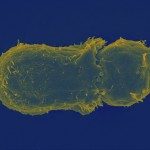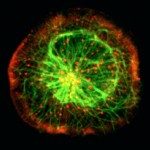Link to Pubmed [PMID] – 28978472
Link to DOI – S2211-1247(17)31281-010.1016/j.celrep.2017.09.020
Cell Rep 2017 Oct; 21(1): 181-194
Adenomatous polyposis coli (APC) is a polarity regulator and tumor suppressor associated with familial adenomatous polyposis and colorectal cancer development. Although extensively studied in epithelial transformation, the effect of APC on T lymphocyte activation remains poorly defined. We found that APC ensures T cell receptor-triggered activation through Nuclear Factor of Activated T cells (NFAT), since APC is necessary for NFAT’s nuclear localization in a microtubule-dependent fashion and for NFAT-driven transcription leading to cytokine gene expression. Interestingly, NFAT forms clusters juxtaposed with microtubules. Ultimately, mouse Apc deficiency reduces the presence of NFAT in the nucleus of intestinal regulatory T cells (Tregs) and impairs Treg differentiation and the acquisition of a suppressive phenotype, which is characterized by the production of the anti-inflammatory cytokine IL-10. These findings suggest a dual role for APC mutations in colorectal cancer development, where mutations drive the initiation of epithelial neoplasms and also reduce Treg-mediated suppression of the detrimental inflammation that enhances cancer growth.




